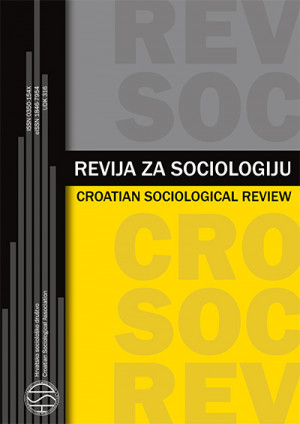Vojislav Trifunović ili Tomislav Lučić: tko ć e se lakše zaposliti u Zagrebu? Testiranje diskriminacije po nacionalnoj i dobnoj osnovi metodom prirodn
Vojislav Trifunović or Tomislav Lučić: Who Will Be Easier to Hire in Zagreb? Testing Ethnic and Age Discrimination through the Method of Field Experim
Author(s): Anton Vukelić, Darja Maslić SeršićSubject(s): Social Sciences
Published by: Hrvatsko sociološko društvo
Keywords: discrimination; field experiment; paired-testing methodology; age,; Croats; Serbs; employment
Summary/Abstract: Vojislav Trifunović ili Tomislav Lučić: tko ć e se lakše zaposliti u Zagrebu? Testiranje diskriminacije po nacionalnoj i dobnoj osnovi metodom prirodnog eksperimenta Vojislav Trifunović or Tomislav Lučić: Who Will Be Easier to Hire in Zagreb? Testing Ethnic and Age Discrimination through the Method of Field Experiment Through conducting the field experiment or situation testing method, the authors checked the equality of opportunities of certain groups in the labour market. The writing test version of the paired-testing method was used to explore whether there is discrimination in the labour market in Zagreb against job applicants of Serbian nationality in comparison to their Croatian equivalent pair, and those of middle age in comparison to twenty year old persons. Besides, the authors were interested in whether the occurrence of discrimination is moderated by gender, education level and the current demand (occupational shortages) of a certain profile. Results are based on data collected from two samples of 173 job announcements published on the web portals “MojPosao”, “Posao.hr” and in daily newspapers. The equivalent pairs of written applications were sent, applica¬tions were defined by the national identity or age of the candidates, and the out¬come of those announcements was monitored. Related callbacks were dependant variables, categorized in three possible outcomes – a positive response (employer invited applicant to access the further selection process), a negative response or rejection, and finally, the absence of any feedback from the employer. The exist¬ence of discrimination based on nationality or age was confirmed in the first round of selection: a candidate with a Serbian sounding given name and surname had less chance of a positive outcome than the equivalent Croatian nationality candidate. The same goes for candidates in their forties in relation to those in their twenties. The level of education and general job availability for a certain occupation predict the outcome of applications by candidates in favoured groups, while the outcome for the discriminated groups is fully dependent on other fac¬tors that were not measured in this research. In addition to these findings, the paper deals with methodological issues and gives recommendations for future research.
Journal: Revija za sociologiju
- Issue Year: 42/2012
- Issue No: 1
- Page Range: 31-59
- Page Count: 29
- Language: Croatian

